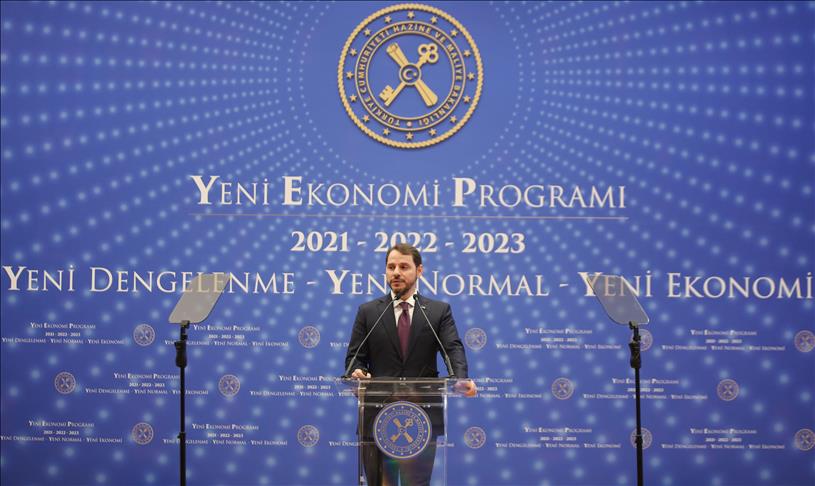Turkey on Tuesday announced its new economic program for 2021-2023 based on themes of new stabilization, new normal, and the new economy, aiming to build a sustainable growth model.
Speaking at the launching ceremony of the program in Istanbul, Treasury and Finance Minister Berat Albayrak said the government considers the main themes as a separate challenge.
Stating the new stabilization means eliminating the negative effects of the pandemic on macroeconomic balance and financial stability, restoring internal and external balance, reducing inflation to a single digit permanently and closing the current account deficit.
Albayrak also noted during the stabilization period, the financial measures that were put into effect due to the pandemic will be phased out gradually.
Steps to eliminate the economic fallout due to coronavirus will continue in the coming days and weeks, contributing to both financial stability and macroeconomic goals, he emphasized.
- New normal
Noting that the ways of doing business, behaviors and preferences in the economy are reshaping, Albayrak said:
'In order to make our economy adapt to this process, accelerating digital transformation, extending e-services to all areas of life, producing new financial solutions and creating new working models are obligatory.'
He also said the government will implement competitive, technology- and efficiency-oriented strategic reforms to reduce vulnerabilities in inflation and current account balance.
'In this context, we will implement an innovative, high value-added, export-oriented, people-oriented and inclusive development model,' he stressed.
- Program's targets
Explaining the details of program Albayrak said the Turkish economy is projected to grow 0.3% this year.
The economic growth is expected to hover around 5% in 2022 and 2023, and to reach 5.8% in 2021 after deferred consumption and investments put into use and tourism revenues normalize.
'To reach our growth targets, we will focus on exports, value-added production, and employment as we've always done,' Albayrak said.
The unemployment rate is projected to reach 13.8% this year and 12.9% next year, according to the program.
Albayrak said the unemployment rate will gradually drop to 10.9% by 2023.
The government will implement policies for economic recovery during the post-pandemic period to support the labor market, he said.
Pointing to the importance of reducing inflation permanently to single digits for setting price stability, Albayrak said the program targeted a 10.5% inflation rate for this year.
'Inflation rate is forecast to stand at 8% by the end of 2021, and drop to 4.9% by the end of the program,' the finance minister stressed.
Stressing that the country started the year with a current account surplus, Albayrak said.
“But we will close the year with a current account deficit due to the unexpected contraction in tourism revenues and the rapidly increasing net gold imports in line with global gold demand.'
Albayrak noted that coronavirus reduced tourism revenues by $25 billion and spurred the net gold imports by $12 billion.
'Excluding these temporary effects, we calculate that we have a current surplus of $12.4 billion in 2020, that is 1.7% of our national income,' he said.
According to him, Turkey, despite pandemic, still has a strong balance sheet compared to other countries across world.
'We also expects budget deficit ratio to GDP to decline gradually throughout 2021-2023 to reach 3.5% by end of program period,' he said.
- Possible risks to growth
Underlining that the government does not ignore possible risks to growth, Albayrak said: 'We are maintaining our cautious stance.'
In this context, he added, when a pessimist scenario is considered in which the pandemic-related restrictions are put in place again, “we assess that our economy can contract by 1.5% in the whole of 2020, and that it can grow by 3.7% in 2021, remaining 2.1 points below the Program's forecast.”
Commenting on the data, Erhan Aslanoglu, an economy professor at Istanbul-based Piri Reis University, said the program also includes negative scenarios, a positive aspect in terms of showing the government's awareness of the uncertain environment in the global economy.
Emphasizing on development rather than growth in the program is a positive thing, he said.
Yet, he added, what is the pathway for supporting the value-added production remains still unclear and that the program contains optimistic inflation targets “given the current conditions of the economy.”
By Aysu Bicer and Tuba Sahin
Anadolu Agency
energy@aa.com.tr


